Rajasthani Legends
Udaipur: Rajasthan
Mother Masala Tours
Udaipur Rajasthan: Fairytale Enchantment
Udaipur Rajasthan. "City of Lakes," an area rich in history that dates back to 1559, when Maharana Udai Singh II founded the city. Located between the Aravalli Hills mountain range, Udaipur became the capital of the Mewar Kingdom, known for its fierce independence and cultural development. The name "Udaipur" comes from Maharana Udai Singh, reflecting its establishment in his honor. Today, Udaipur has a population of approximately 450,000, thriving amidst beautiful gardens and picturesque lakes like Lake Pichola and Jag Mandir - a floating Island. The city is known for its exquisite palaces, colorful festivals, and the strong culture upheld by its residents.
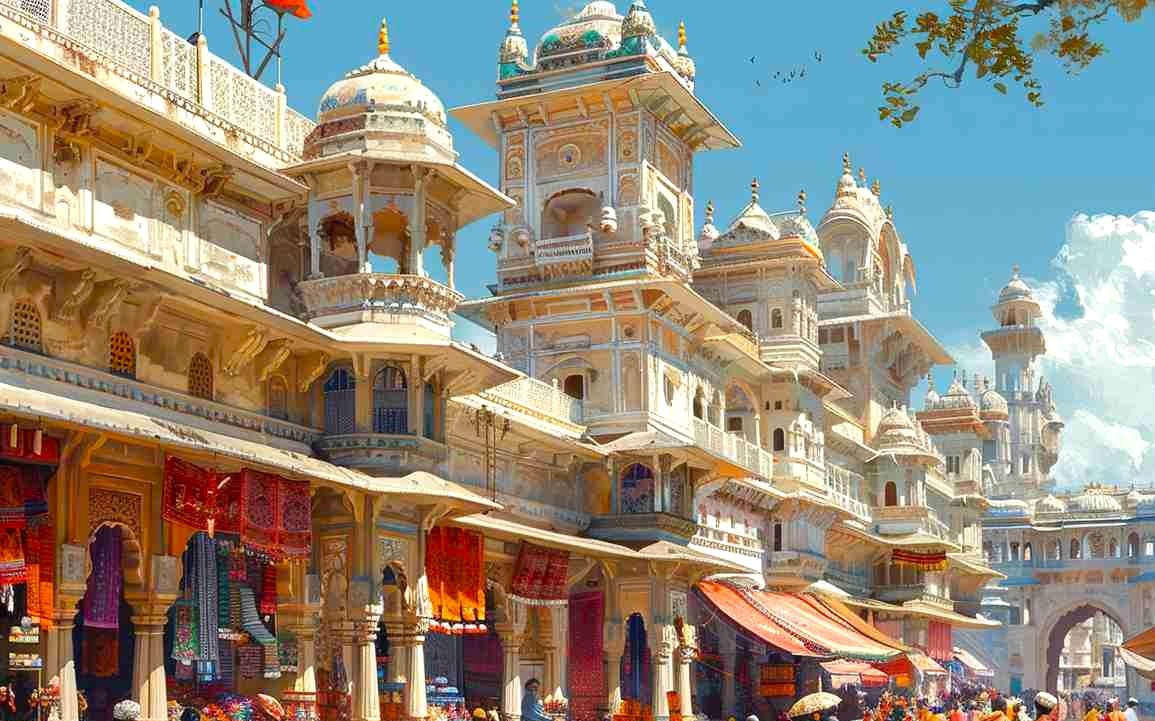
Udaipur Rajasthan: Sacred Spaces
Udaipur Rajasthan. Rich in artifacts and sacred spaces that reflect its historical significance. Among its most notable sites is the City Palace, a vast complex that reveals elements from different periods of Mewar's history. Made largely from granite and marble, this structure houses museums containing antique collectibles, royal garments, and artistic works that narrate the story of the Mewar Dynasty. The Jagdish Temple, dedicated to Vishnu and built in 1651, features stunning intricate carvings and a towering shikhara - spire, that attracts many pilgrims.
Ancient Mosaics: Impeccable Craftsmanship
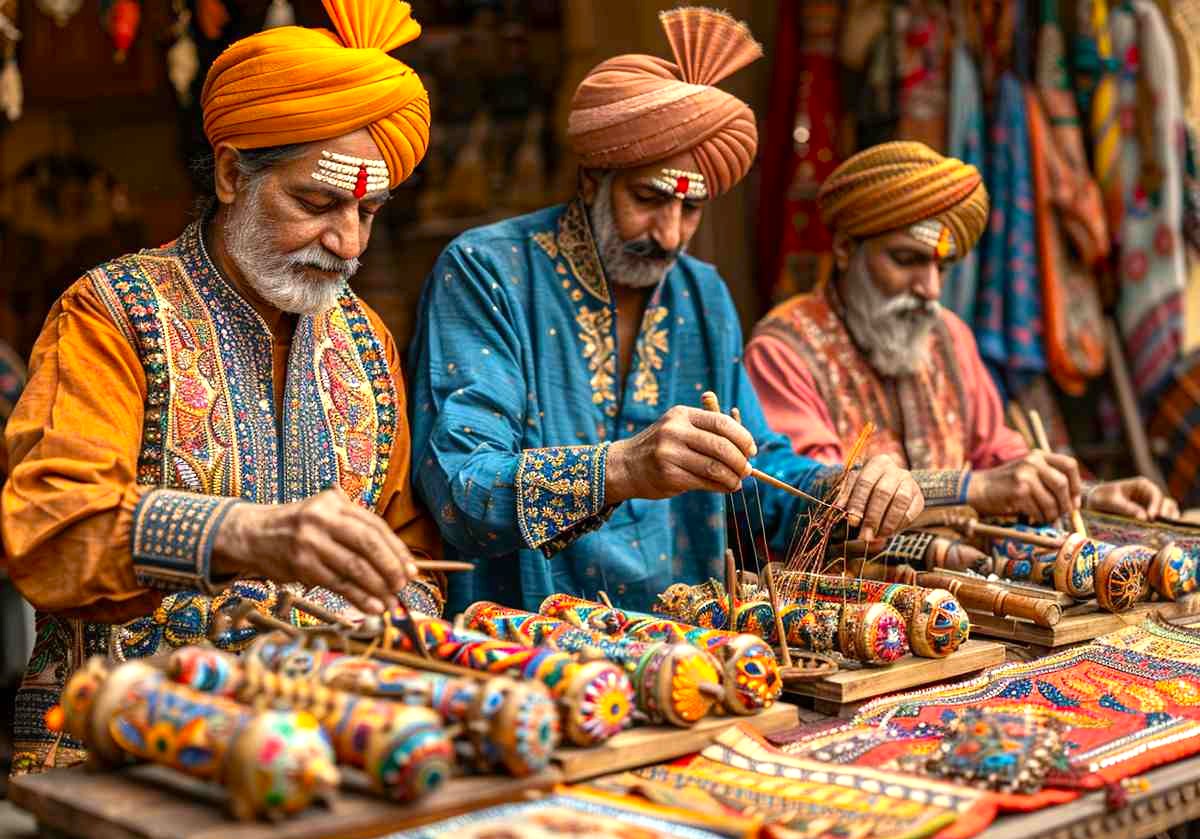
The craftsmanship seen in Udaipur's structures is a testament to the skills of artisans who have worked over the centuries. The City Palace alone features a blend of Renaissance and Mughal influences, with elements such as the peacock mosaics adorning the walls. These colorful patterns were created using small pieces of colored glass and stone, demonstrating meticulous attention to detail. Another example can be found in the Saheliyon-ki-Bari - Garden of the Maidens, built in the 18th century.
The Pulse of the Local Community
Experience the vibrant daily life of Udaipur, Rajasthan, where skilled artisans bring centuries-old traditions to life. In the bustling markets, you'll find local craftsmen wearing colorful turbans, deeply focused on their work. They meticulously create beautiful hand-embroidered textiles and intricate lacquerware, showcasing the rich cultural artistry of India. Each piece tells a story of heritage and dedication, passed down through generations. This is more than just a market; it’s an immersive glimpse into the heart of local culture, where every handcrafted item is a piece of Udaipur's living history.
Capturing the Magic: A Photographic Haven
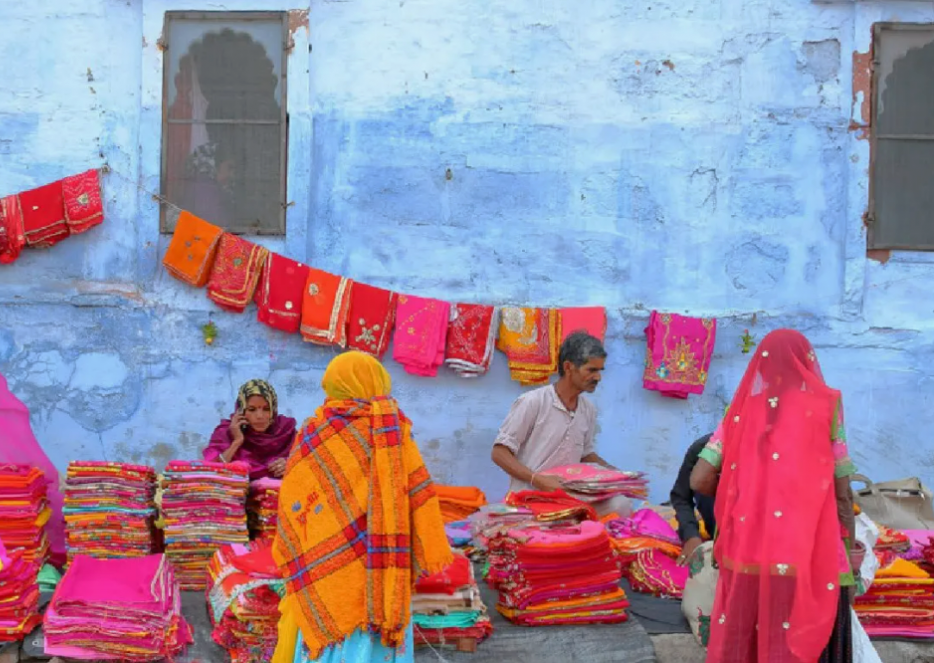
Udaipur is a dream for photographers, offering beautiful landscapes and amazing architecture. You can capture stunning photos of the City Palace reflecting in the calm waters of Lake Pichola. The city’s daily life is full of color, especially the traditional boat rides which offer great shots. The streets reveals countless moments where nature and architecture blend perfectly. These pictures become more photos, they are cherished memories of your time spent in this incredible city.
A Culinary Journey: Savor the Flavour
Local cuisine in Udaipur is a flavorful reflection of Rajasthani traditions. One notable dish is Dal Baati Churma, a staple that consists of hard wheat rolls (Baati) served with a lentil dish (dal) and sweet crumbled wheat with ghee (Churma). To prepare this dish, the Baati is baked over open coals, giving it a unique smoky flavor. The dal is cooked with a variety of spices, creating a hearty accompaniment. This dish is not just about food; it’s a cultural experience often served during festivals and family gatherings, symbolizing unity and celebration.
The Connection with the Gods
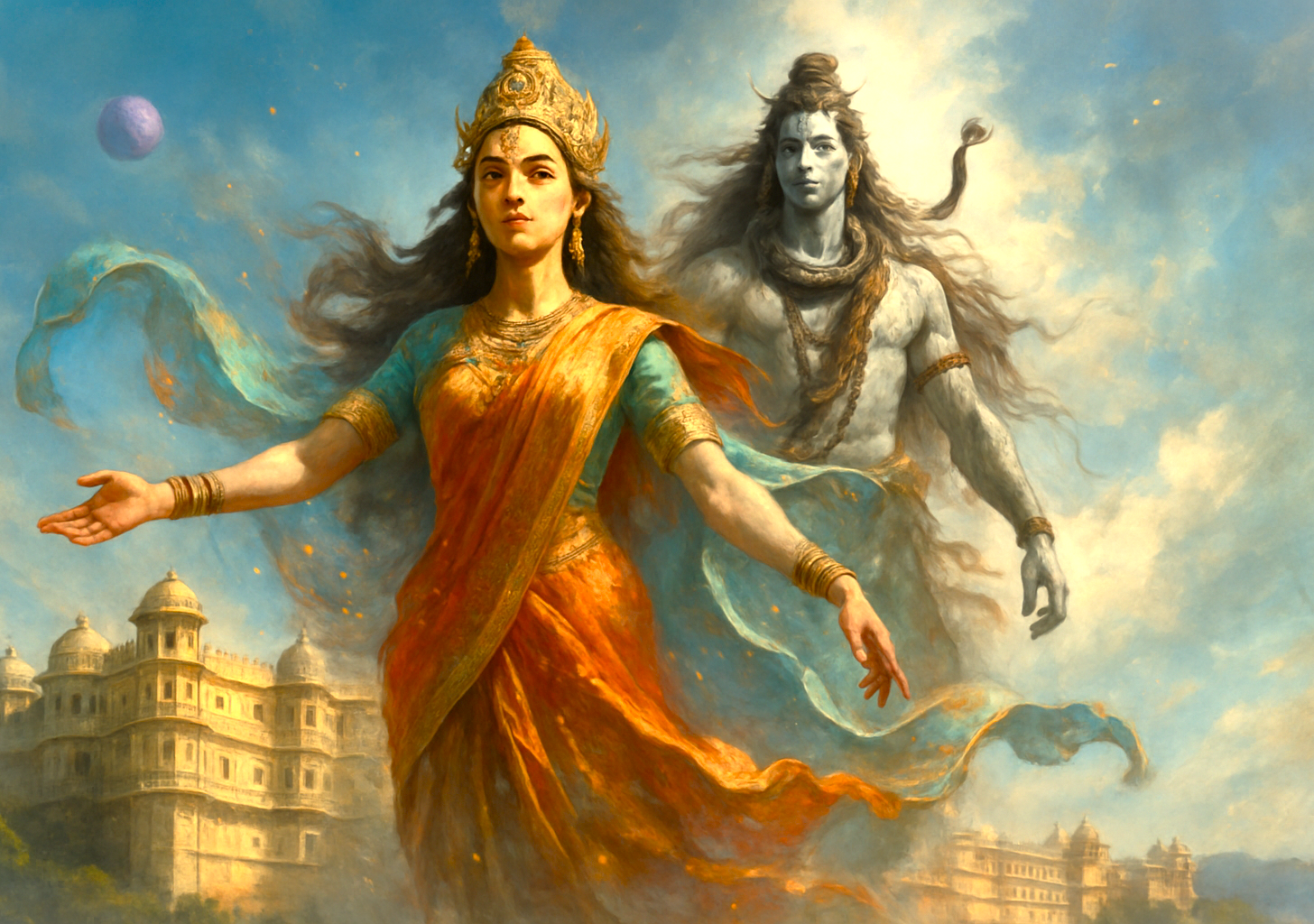
Steeped in legends and tales of deities that reflect the spiritual fabric of the "White city". Among the revered is Shiva, whose presence is felt deeply during major festivals. Temples such as the Jagdish Temple, where his idol resides, serve as key sites of worship. Goddess Gauri, consort of Shiva, who symbolizes purity and marital bliss, is also a favourite. The rituals surrounding her worship form an essential part of local culture. The connection to these divine figures enhances the spiritual atmosphere.
Festivals of Devotion: Honouring the Sacred and the Divine
Udaipur hosts numerous festivals that highlight its spiritual and cultural heritage. One of the most captivating is Maha Shivaratri, celebrated annually in February or March. This festival commemorates Shiva and sees the city adorned with flowers and lights, while devotees engage in rituals at various temples. Another event is the Gangaur festival, held in March or April, which celebrates the worship of the Goddess Gauri. This vibrant festival involves processions, music, and traditional dance, drawing participants from surrounding areas.
Serendipitous Meetings: Beyond the Main Path
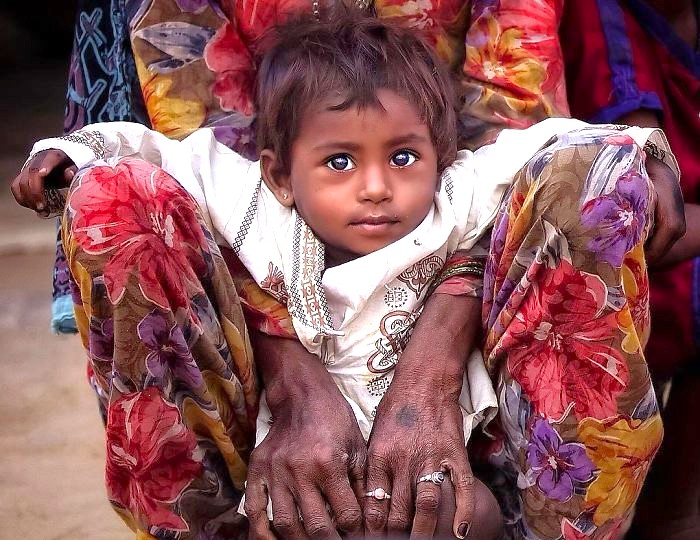
The streets of Udaipur can lead to unexpected delights and charming surprises. Local markets offer an array of handcrafted items, from intricate textiles to delicate jewelry. By exploring these small corners, we can discover hidden artisans engaged in their craft. Wandering toward the outskirts, you may find installations of local pottery or small cooking classes that offer hands-on experiences. These unexpected encounters allow us to engage with the community and learn about their livelihoods. We encourage you to roam with an open heart and a curious spirit.
Ancient Technologies: Sacred Sound, Geometry & Astrological Influences
The structures in Udaipur reflect advanced understanding of geometry and sound, incorporated into the designs of temples and palaces. For instance, the City Palace exemplifies sophisticated spatial planning, allowing for resonance and sound clarity. The use of marble and red sandstone not only enhances aesthetic appeal but provides cooling and acoustic properties. These natural materials have been known to create a healing atmosphere, often felt in meditation practices held in temple spaces. Particularly, the Solefeggio frequencies, especially 528 Hz, derived from ancient musical scales, are believed to promote healing and spiritual transformation.
Resilience and Renewal: Overcoming Adversity’s Challenges
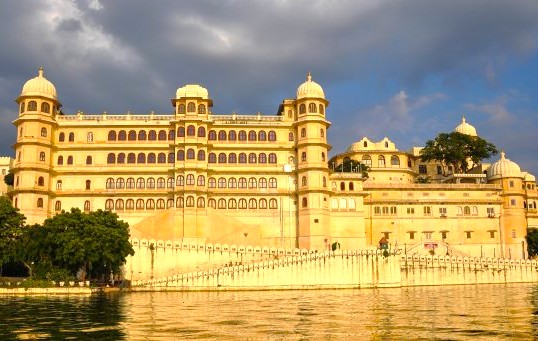
The history of Udaipur is marked by resilience in the face of adversity. Significant battles, such as the Siege of Udaipur in the 16th century, tested the resolve of the residents against the Mughals. Despite overwhelming odds, the spirit of the people led to their persistent fight for independence. Natural disasters have also shaped the city's landscape. The flood of 2006 impacted the community significantly, damaging infrastructure and displacing many families.
Urban Legends: Strange Sightings, Myths and Mysteries
Udaipur is rich with legends and myths that leave an air of intrigue. One well-known story revolves around Lake Pichola, said to be haunted by the spirit of a princess who drowned in its waters centuries ago. Locals claim to hear her haunting melodies at night, adding to the lake's mystique. Another legend tells of the City Palace's secret tunnels, which were purportedly used for communication and escape by the royal family during times of danger. These stories of hidden pathways add an element of adventure to the city's already mesmerizing charm.
Pack Your Bags - Your Invitation Awaits, Let’s Go
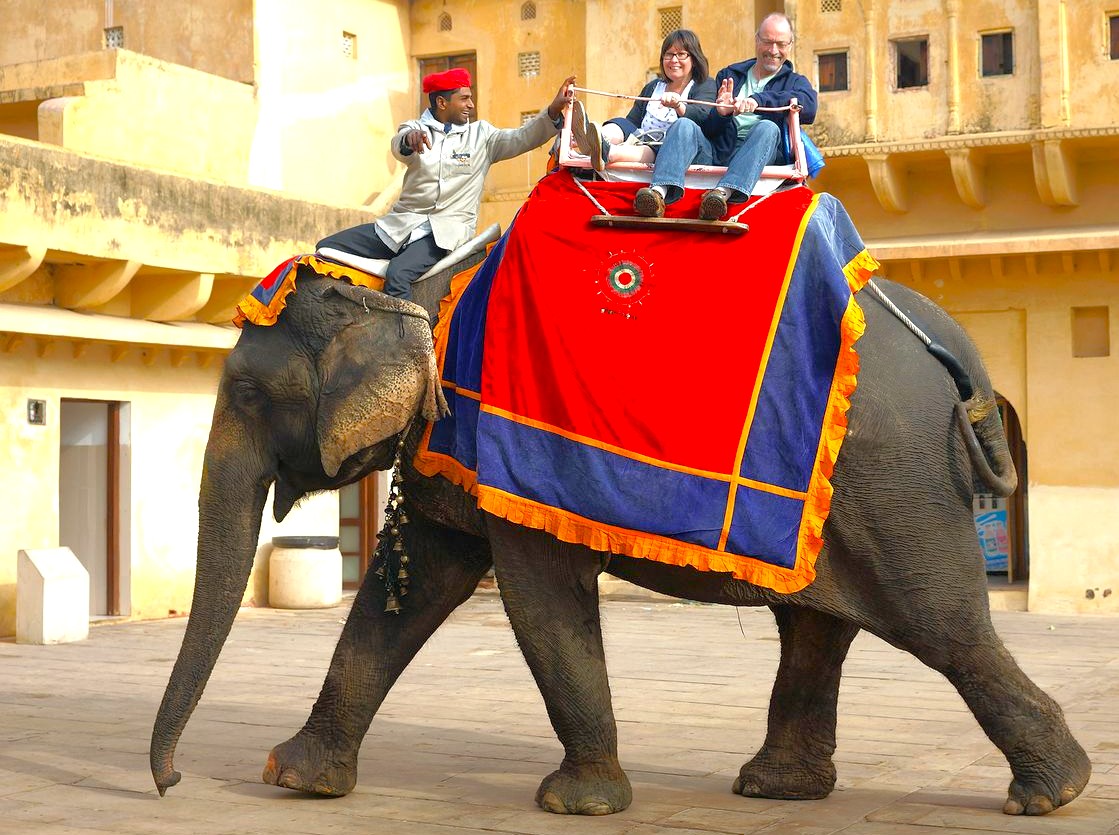
Join us in discovering the beauty of Udaipur. We will explore the stunning lakes and intricate palaces that make this city unique. As we journey through local markets and taste traditional dishes, we will immerse ourselves in the vibrant culture and artistic spirit of the community. Experience the magic of a guided elephant ride, a classic way to see the historic sights. Capture stunning photographs of traditional architecture and create lasting memories of your journey through this enchanting part of Rajasthan, India.
Symphony of Generosity: Offerings from Wanderers to Residents
The interactions between the locals in Udaipur and travelers foster a symbiotic relationship that enhances the cultural landscape. Each time we shop at local markets or enjoy a meal at family-run eateries, we contribute to the community’s livelihood. This exchange allows us to experience authentic traditions while providing essential support to artisans and local businesses. As we take part in their customs, we learn about the significance of their crafts and flavors, enriching our understanding of this beautiful region.